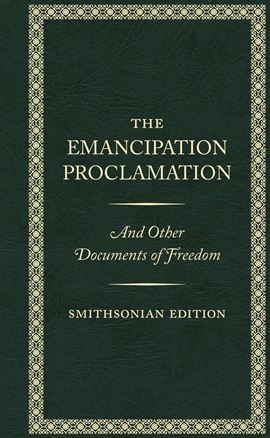Description
This distinguished edition captures a pivotal moment of justice in the United States with a document that paved the way for the abolition of slavery
This handsome, pocket-sized Smithsonian edition printed in the United States contains Lincoln's groundbreaking executive order and the writings that helped form it, with features that make it the perfect keepsake:
Bound in faux leather Foil-stamped in goldSturdy, quality hardcoverThe edition stands out in the market with an illuminating new introduction from Paul Gardullo, curator at the Smithsonian's National Museum of African American History. His research on the impact of slavery in America's cultural memory contextualizes the historical document as part of a larger cultural narrative, connecting its legacy to modern day.
Abraham Lincoln considered the Emancipation Proclamation the crowning achievement of his presidency, and it is easy to see why. The imperative document freed African Americans enslaved in the Confederate states, transformed the purpose and stakes of the Civil War, and served as a precursor to the Thirteenth Amendment, which would end slavery across the nation. The Emancipation Proclamation was a major turning point in the struggle for African American freedom.
About the Author
Abraham Lincoln, the sixteenth president of the United States from 1861, led during the Civil War, and emancipated slaves in the south in 1863; shortly after the end,John Wilkes Boothassassinated him.Heroic monuments ofAugustus Saint-Gaudensinclude the standing figure of Abraham Lincoln in Chicago in 1887.Abraham Lincoln, an American lawyer, politician, and man, served until 1865. Lincoln defended the American constitutional nation, defeated the insurgent Confederacy, abolished, expanded the power of the Federal government, and modernized the economy.A mother bore him into poverty in a log cabin in Kentucky, and parents reared on the frontier, primarily in Indiana. He educated as a lawyer in Whig party, joined legislature, and represented Illinois. In 1849, he returned to his successful law practice in Springfield, Illinois.The Kansas–Nebraska act in 1854 opened the territories, angered him, and caused him to re-enter politics. He quickly joined the new Republican Party. He reached a national audience in the campaign debates againstStephen Arnold Douglasfor Senate in 1858. Lincoln ran in 1860 and swept the north to gain victory. Other elements viewed his election as a threat and from the nation began seceding. During this time, the newly formed Confederate of America began seizing Federal military bases. A little over one month after Lincoln assumed, Confederate forces attacked Fort Sumter in South Carolina. Following the bombardment, Lincoln mobilized forces to suppress the rebellion and restored.Lincoln, a moderate, navigated a contentious array of factions with friends and opponents from the Democratic Party and Republican Party. His allies, the Democrats, and the radical Republicans, demanded harsh treatment of the Confederates. He exploited mutual enmity of the factions, carefully distributing political patronage, and appealed to the American people. Democrats, called "Copperheads," despised Lincoln, and some irreconcilable pro-Confederate elements went so far as to plot. People came to see his greatest address at Gettysburg as a most influential statement of American national purpose. Lincoln closely supervised the strategy and tactics in the effort, including the selection of generals, and implemented a naval blockade of the trade. He suspended habeas corpus in Maryland and elsewhere, and averted British intervention by defusing the Trent Affair. He issued the proclamation, which declared free those "in rebellion." It also directed the Navy to "recognize and maintain the freedom of such persons" and to receive them "into the armed service." Lincoln pressured border to outlaw, and he promoted the thirteenth Amendment to the Constitution, which abolished, except as punishment for a crime.Lincoln managed his own successful re-election campaign. He sought to heal the torn nation through reconciliation. On April 14, 1865, just five days after the Confederate surrender at Appomattox, he attended a play at theater of Ford in Washington, District of Columbia, withMary Todd Lincoln, his wife, when Confederate sympathizer fatally shot him. People remember Lincoln as a martyr and a national hero for his time and for his efforts to preserve and abolish. Popular and scholarly polls often rank Lincoln as the greatest in American history.
